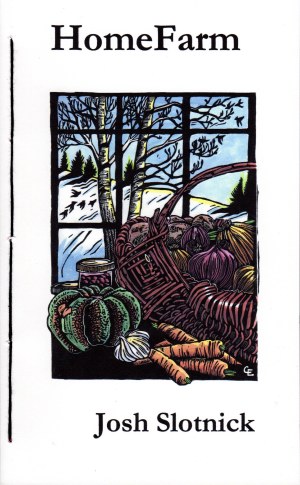With the days getting longer and seed catalogs replacing holiday cards in the mailbox, a gardener’s thoughts inevitably turn to that blank patch of dirt where, if all goes well, he or she will spend an inordinate amount of time this summer.Josh Slotnick, a farmer and poet in Montana, believes this work makes you a better person. "Small groups doing humble labor with tangible results is a transformative experience," he told me.His debut collection of poetry, HomeFarm (FootHills Publishing), is a glimpse into the life of a farmer. The highs and lows he traverses are dizzying but the farmers I’ve met seem to share a certain even-keel, as one might hope from ship captains that steer valuable cargo through potentially stormy seas.He compares his vegetable farm to a mandala, a Buddhist tradition that’s part meditation device and part performance art. Tibetan monks periodically visit the University of Montana, Slotnick explains, and spend a week or so creating a 10-foot square painting out of grains of colored sand. The result, ornate and dazzling, is cheerfully tossed in the river upon completion as an embrace of impermanence and of process over product, Slotnick explains, and he can relate."You can walk into the corn, over your eyes, and feel the humidity swell, and if you stop moving and stand rock still, the sound of bees fills your ears, the squash becomes an impenetrable sea of spiky green, the flowers, carrots, all of it, fill every sensory level, and then come fall, we mow it down and till it in—pour the sand into the river—and it’s a flat sameness once again."In between the growing seasons, Slotnick is fixing things, dealing with angry neighbors about a messy pig slaughter and moving miles of irrigation pipe.Carrying 50-foot lengths of the pipe, one on each shoulder, is a meditation itself that recurs within the season-long mandala. One evening, as he moves pipe with his teenage son, Slotnick reflects on the bittersweet fact that his nest will soon be empty.How many evenings have you and I done this,while the sky goes pink to orangethe mountains flatten to silhouette in the westwe flop lines of pipe from one side of the mainline to the otherjuggle end caps, T’s and elbowssoak the big squash for hourskeep the seedbeds dampthe mowed beds drywhere I will till on SundayI have my own garlic mandala—formerly known as my garden—to tend to. It’s basically a garlic patch with a year’s supply of garlic planted. Planted six inches apart in fall, I harvest the next summer. Each spring I toss an assortment of seeds between the emerging garlic plants. If the plants they code for don’t belong, they die. The ones that live in the shade of the garlic plants take off in July when the garlic is pulled.The garlic mandala comes and goes, leaving a stash of bulbs in its wake. Does it also make me a better person? I like to think so. It certainly makes me a happier person. Why is a question I’ll leave to the poets.
HomeFarmBy Josh SlotnickFootHills Publishing, softcover, $16Available at foothillspublishing.com or at your local indie bookstore


